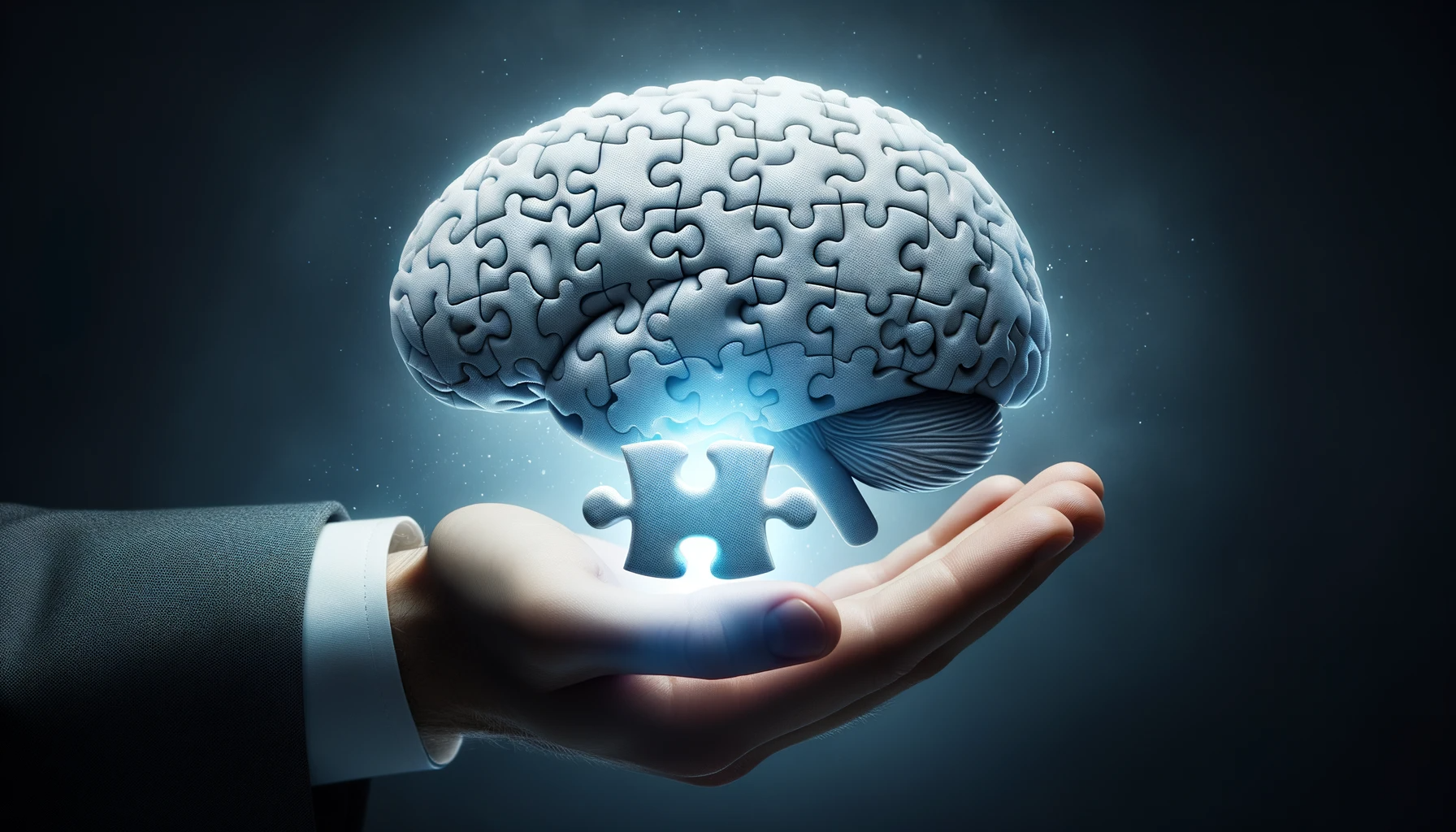Have you ever wondered why some people seem to have a more positive outlook on life, while others tend to focus on the negative? It’s all about mindset, and it turns out that the brain plays a significant role in shaping the way we think and feel. In this article, we’ll explore how the brain plays into mindset and what you can do to cultivate a more positive outlook by understanding how the brain influence our mindset
When it comes to our mindset, the brain plays a crucial role. Our mindset is related to brain plasticity and neural networks formed by learning. The psychologist and researcher Carol Dweck has spent decades studying how there are people who develop their full potential and others who, with the same talent, do not. Her research shows that our mindset can either limit or enhance our abilities.
The brain is the most complex organ in the human body and is the object of countless research. It’s also a significant research subject as scientists strive to understand how it works and its role in our mindset. Our brain is a dynamic system that assimilates information, makes predictions, and reorganizes itself upon them. Therefore, it’s important to understand how the brain plays into our mindset and how we can use this knowledge to improve our lives.
Research shows that mindsets play a significant role in determining life’s outcomes. This is because our mindset affects how we perceive and respond to different situations. For example, a person with a growth mindset believes that their abilities can be developed through hard work and dedication, while a person with a fixed mindset believes that their abilities are fixed traits that cannot be improved. Understanding how the brain plays into our mindset can help us develop a growth mindset and achieve our full potential.
The Brain and Mindset: An Intrinsic Connection
When it comes to mindset, the brain plays a crucial role in shaping our thoughts, emotions, and behaviors. The way we perceive the world around us, our beliefs, and our attitudes are all influenced by the intricate workings of our brain. Let’s explore the connection between the brain and mindset in more detail.
Neuroplasticity and Mindset
One of the most fascinating aspects of the brain is its ability to change and adapt over time. This process is known as neuroplasticity, and it plays a crucial role in shaping our mindset. Our experiences, thoughts, and emotions can all influence the neural pathways in our brain, which can lead to changes in our behavior and mindset.
Research has shown that individuals with a growth mindset, who believe that their abilities can be developed through hard work and dedication, have a more active and flexible brain compared to those with a fixed mindset. This is because individuals with a growth mindset are more likely to engage in new experiences and challenges, which can help to strengthen the neural connections in their brain.
Brain Chemistry and Cognitive Processes
The brain’s chemistry and cognitive processes also play a crucial role in shaping our mindset. The neurotransmitters in our brain, such as dopamine and serotonin, can influence our mood, motivation, and overall mindset. For example, low levels of serotonin have been linked to depression and anxiety, while high levels of dopamine can lead to feelings of pleasure and reward.
Cognitive processes, such as attention, perception, and memory, are also influenced by the workings of our brain. Our ability to focus our attention and filter out distractions can impact our mindset and ability to learn and grow. Similarly, our memory processes can influence our beliefs and attitudes, as we tend to remember information that confirms our existing beliefs.
In conclusion, the connection between the brain and mindset is a complex and fascinating topic. Our brain’s ability to change and adapt over time, as well as its chemistry and cognitive processes, all play a crucial role in shaping our mindset. By understanding this connection, we can take steps to develop a growth mindset and cultivate a more positive and resilient attitude towards life’s challenges.
The Role of the Prefrontal Cortex in Shaping Mindset

The prefrontal cortex (PFC) is a region of the brain that plays a crucial role in shaping mindset. It is involved in various high-order cognitive processes such as decision-making, emotional regulation, and self-reflection. The PFC is responsible for the ability to think about our own thinking, which is known as metacognition. This ability is essential for developing a growth mindset, which is the belief that intelligence and abilities can be developed through hard work, perseverance, and dedication.
Research has shown that the PFC is involved in the development of a growth mindset. A study published in the journal Neuroscience found that individuals with a growth mindset had greater activation in the PFC than those with a fixed mindset. This suggests that the PFC plays a crucial role in shaping our mindset and beliefs about intelligence and abilities.
Moreover, the PFC is also involved in intrinsic motivation, which is the drive to engage in an activity for the sake of the activity itself rather than for external rewards. Intrinsic motivation is closely related to growth mindset as it fosters a love of learning and a desire to improve. The PFC is responsible for regulating dopamine, a neurotransmitter that is involved in reward processing and motivation. Studies have shown that individuals with greater PFC activation have higher levels of intrinsic motivation.
In conclusion, the prefrontal cortex plays a crucial role in shaping mindset by facilitating metacognition, developing a growth mindset, and fostering intrinsic motivation. Understanding the role of the PFC in shaping mindset can help us develop strategies to cultivate a growth mindset and intrinsic motivation, which can lead to greater success in various aspects of life.
The Limbic System: Emotional Regulation and Mindset

The limbic system is a complex set of brain structures involved in emotion, motivation, memory, and behavior regulation. It includes the amygdala, hippocampus, thalamus, hypothalamus, basal ganglia, and cingulate gyrus. Understanding the limbic system’s role in emotional regulation can help us understand how the brain plays into mindset.
Amygdala and Fear Response
The amygdala is a small, almond-shaped structure in the limbic system that plays a critical role in processing emotions, particularly fear. When we encounter a threat, the amygdala sends a signal to the hypothalamus, which activates the sympathetic nervous system’s fight or flight response. This response prepares us to either confront the threat or flee from it.
In the context of mindset, the amygdala’s role in fear processing can be problematic. If we perceive a situation as a threat, even if it is not, our amygdala can trigger a fear response that inhibits our ability to think rationally and make sound decisions. By learning to recognize and regulate our fear response, we can better manage our mindset in challenging situations.
Hippocampus and Memory
The hippocampus is a seahorse-shaped structure in the limbic system that plays a crucial role in memory processing. It is responsible for encoding and retrieving memories, particularly episodic memories, which are memories of specific events and experiences.
In the context of mindset, the hippocampus’s role in memory processing is essential. Our past experiences and memories shape our beliefs and attitudes, which, in turn, influence our mindset. By understanding how the hippocampus encodes and retrieves memories, we can learn to intentionally shape our mindset by focusing on positive experiences and memories.
In conclusion, the limbic system plays a critical role in emotional regulation and memory processing, which are essential components of mindset. By understanding how the amygdala and hippocampus function, we can learn to regulate our emotions and intentionally shape our mindset.
The Power of Positive Thinking: Neurological Evidence

We often hear about the importance of positive thinking in our daily lives, but what does it really mean? And how does our brain play a role in this mindset?
Recent studies have shown that positive thinking can have a significant impact on our brain and overall well-being. When we think positively, our brain releases neurotransmitters such as dopamine and serotonin, which are associated with feelings of happiness and pleasure. These chemicals can help reduce stress and anxiety, improve our mood, and even boost our immune system.
Moreover, positive thinking can also lead to changes in the structure of our brain. One study found that individuals who practiced positive thinking for just a few weeks had increased gray matter density in areas of the brain associated with self-awareness, empathy, and emotional regulation. This suggests that positive thinking can not only improve our mental health, but also enhance our ability to understand and connect with others.
Another study found that individuals with a positive mindset had lower levels of the stress hormone cortisol, which is linked to a range of health problems including cardiovascular disease and depression. In contrast, individuals with a negative mindset had higher levels of cortisol and were more likely to experience negative health outcomes.
Overall, the evidence suggests that positive thinking can have a powerful impact on our brain and overall well-being. By cultivating a positive mindset, we can reduce stress, improve our mood, and even enhance our brain structure. So the next time you find yourself in a negative thought spiral, try to reframe your thinking and focus on the positive aspects of your life. Your brain (and body) will thank you for it!
Mindset and Mental Health: A Neurological Perspective

When it comes to mental health, our mindset plays a crucial role. According to psychologist and researcher Dr. Carol Dweck, our mindset is how we think about ourselves, and this can directly affect our behavior and learning ability.
From a neurological perspective, our mindset is closely linked to the brain’s plasticity, or its ability to change and adapt over time. Our thoughts and behaviors can shape the neural pathways in our brain, and this can either strengthen or weaken certain connections. For example, negative thought patterns can reinforce anxiety and depression, while positive thought patterns can promote resilience and well-being.
Research has also shown that our mindset can influence our response to stress. A growth mindset, or the belief that we can learn and grow from challenges, can help us cope with stress more effectively. On the other hand, a fixed mindset, or the belief that our abilities are set in stone, can lead to feelings of helplessness and anxiety in the face of stress.
In addition, our mindset can impact our relationships with others. A mindset focused on growth and learning can promote empathy and understanding, while a mindset focused on competition and comparison can lead to conflict and isolation.
Overall, understanding the neurological basis of mindset can help us cultivate a more positive and resilient outlook on life. By focusing on growth and learning, we can promote healthy neural connections and support our mental health and well-being.
My Most Significant Insights on How the Brain Plays Into Your Mindset

As we explore the connection between the brain and our mindset, we can see that the brain plays a significant role in shaping our daily lives. Here are some of our most significant insights on how the brain plays into your mindset:
Brain Plasticity
One of the most important things to understand about the brain and mindset is the concept of brain plasticity. This refers to the brain’s ability to change and adapt in response to new experiences and learning. By understanding this concept, we can see that our mindset is not fixed and can be changed through intentional effort and practice.

Neural Networks
Neural networks are another key component of the brain’s role in mindset. These networks are formed through learning and experience, and they shape our thoughts, beliefs, and behaviors. By intentionally focusing on creating positive neural networks, we can develop a more growth-oriented mindset that helps us achieve our goals.
Mindset Types
Psychologist Carol Dweck has identified two types of mindsets: fixed and growth. Fixed mindsets believe that abilities and traits are fixed and unchangeable, while growth mindsets believe that abilities and traits can be developed through effort and practice. By understanding our own mindset type, we can work to develop a more growth-oriented mindset that helps us achieve our goals.
Maladaptive Mindsets
It is also important to recognize that some mindsets can be maladaptive and hold us back from achieving our goals. For example, a belief that others cannot be trusted may have been adaptive at one point in life but can lead to interpersonal issues later on. By recognizing and working to change maladaptive mindsets, we can develop a more positive and growth-oriented mindset.
Overall, the brain plays a significant role in shaping our mindset, and by understanding how the brain works, we can work to develop a more positive and growth-oriented mindset that helps us achieve our goals.
If you liked this blog post about the topic how does the brain influence our mindset, don’t forget to leave us a comment down below to tell us about your experience with it. Keep reading on the Brainmates Blog – we cover all content regarding personal development
Frequently Asked Questions
What are the characteristics of a growth mindset?
A growth mindset is characterized by the belief that intelligence and abilities can be developed through hard work, dedication, and persistence. People with a growth mindset embrace challenges, view failures as opportunities to learn and grow, and see effort as a necessary step towards mastery.
How does having a growth mindset benefit our mental health?
Having a growth mindset can benefit our mental health in several ways. It can help us cope with stress and anxiety, increase our resilience, and improve our overall well-being. People with a growth mindset are more likely to seek out new experiences, learn from their mistakes, and have a positive outlook on life.
What is the relationship between the brain and mindset?
The brain and mindset are closely interconnected. Our mindset can influence the way our brain processes information and the neural pathways that are activated. Research has shown that having a growth mindset can lead to changes in the brain’s structure and function, including increased neural plasticity and the development of new neural connections.






